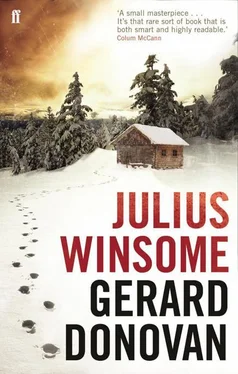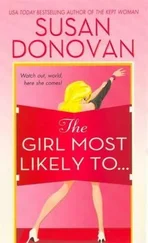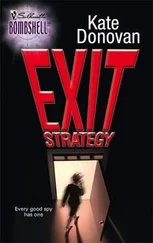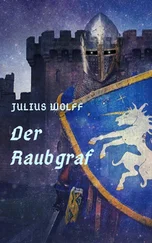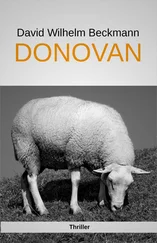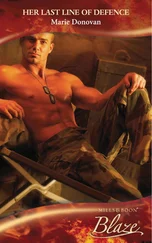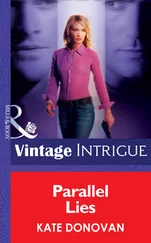We drove in the afternoon to the west end of the valley until the road ran out at the Allagash wilderness. I parked at the side of a small store by the bridge in front of a large field with fifteen or twenty rusted cars and buses, some from the forties and fifties, clumps of grass showing from the partially open hoods. I left Hobbes in the truck and we walked until I turned and saw that he was a silent waterfall of barking glued to the glass. He noticed what we had not yet seen, what was even now watching us. When we were about to step onto the porch two white wolves jumped down from a bus window and trotted toward us, wolves, the farthest things from men, from any leash that stretches around a property or from a hand.
They moved easily into a run and the crystal blue eyes took up more of their bodies as they covered more ground, a younger one and an older one. I told Claire they were pets, not to worry, though I wasn’t sure yet. See, they were slowing down and their tales wagged. When they reached us Claire seemed afraid even though they ignored her and took no actions that indicated they knew she was even there. She shrank back to the truck. One carried a stick in its mouth, a husky and wolf mix, afraid of nothing. They lay on two front seats torn out of a van and placed side by side on the porch facing the road. I rubbed their ears and moved inside: a man came out of a side room on a walking stick wearing a war veteran shirt, and when he heard what I asked for, kindly made me a fresh cup of coffee, and then we talked in the shadows for a while.
Through the door, as I tried the new coffee, I watched her stare at the sleeping wolves, a stare with absence sown into it, and I decided to keep the card I bought from him, what I had meant to press into her hand to ease the worry I felt in her, a card of a Furbish’s Lousewort that grows on both banks of the Saint John River, nowhere else. Above it I had written three letters with the fountain pen:
You.
After that day she did not return.
* * *
In the months following I often drove through Fort Kent and saw the smoke winding up from chimneys like ropes attached to the sky, as if the houses hung from them, and I glanced at the windows with their amber lights and imagined what was happening inside, the evening sweaters taken from storage and shaken, the heated wine poured into glasses as the sun grew gold on the trees, the conversation—what it was like, going on late in the year, to be with another person. It took me a long time to understand that she could never have wanted the life I had.
THE PRESENTATION OF EVIDENCE WAS OVER, AND THE only one I could find guilty was me: guilty of having brought the accused to it. Now on this first November night of winter I found myself standing inside the circle of trees at such a late hour, holding my midnight court. More geese flew south, long lines in the dark flying low over the trees, scraping them with their peals, scorching the low cloud with their instinct, and still louder as they crossed directly above, fanning the arrow out wide from the tip, streaking through the night sky like broken glass. I should fly with them. This cold.
It was as clear to me as the direction of the geese that Claire could not be the one who did this murder. She may have been careless with men’s hearts, but surely she was not cruel. Tonight I should have gone straight back to bed, should have switched off the lamp of memory and remembered nothing. Perhaps I wanted to bring her near to me once more, feel for another hour what I had then.
If the culprit came from that time, there had to be someone else, perhaps the one she left behind, a silent man upset at being abandoned. I searched through the weeks I spent with her, looked for a trace of him, something I may have not noticed.
Somewhere I had not looked.
I SAW HIM.
I closed my eyes in the clearing and remembered one evening during the time I was seeing Claire: I was driving home alone when the mist was draped around the church steeple on the other side of the river and was heaviest on the river itself. The lights of a car in New Brunswick driving the other way shone on the silver yarn of the street. The road was sparsely traveled in these conditions. A mile out of town my rear window lit up with the lights of another car. I veered off the road and waited in the shoulder with my engine running and an eye on the mirror trying to see through the mess of the swirling fog on a long road. The car did not pass. Another few miles down the road to the cabin I thought I saw weak headlights again sift in and out of the mist. I drove to the corner and then to the treeline and parked, turned off the lights and waited to see if anyone went by, rolling down the window and looking back in case I missed anything. After thirty seconds a car went by with its lights low, shrouded in fog that peeled off it. I continued up to the cabin until Hobbes bounded down the lane to meet me a hundred yards from the cabin, his eyes shining in the headlights, then the white crest and his tail. He knew the sound of the engine and was the cabin’s little alarm clock, had stirred himself into a bark when he heard the truck.
I should have followed that car. I should have overtaken it and slowed it to a stop and walked over to it and tapped on the window. If I had, Hobbes might be alive today. But what did I know then? He was not dead then. It was just a car behind me.
Was that the person who brought a shotgun to these woods a few days ago, the day Hobbes went for his walk? Given what happened as a result, others would be along, no doubt. I opened my eyes and looked into the forest, gripped the rifle and swung at the dark trees.
No men tonight. But they’d be back, yes, those shooters, they would. Some people will not go away, they are too fastened to their habits, they arrive over their own tracks, observe in the same manner, speak the same words, always their undoing. I would meet that driver again. But when I looked down under my feet I did see men: I counted them in the hole with my dog when I looked down to where he was under me, a foot under me as I stood on the slope of absent flowers, I counted as many men packed around him as might have killed him, however many that was or might turn out to be. It was an illusion, a fancy of the brain, since to be accurate those hunters were spread under the forest behind me, but more men were coming out of that forest for me tomorrow, skilled and resourceful men like the ones before, or better this time. The bullet that took his life went through Hobbes and killed a number of them, and there was room in that hole for more. That bullet was not done with its flight yet. Maybe I had not killed them enough.
There was time to fix that. The clearing around me was what the French soldiers called the space between trenches in the Great War: nomensland , what the English called no man’s land , the place you dare not go, because once you cross it you will not come back, not the same man who left.
The night froze me like a stick and shook me at the world, I was that stick being shook at the world. I looked at my hand holding the gun stock. I was the rifle. I was the bullet, the aim, what a word means when it stands on its own. That is what revenge means even if you write it down.
THE SNOW WAS THICK AND SAILING ON THE BREEZES. I went back to the bedroom and pulled the blankets above me, sank into them and curled up as much as I could, and the circle made its own heat, enough that soon I was able to straighten out again. The plastic I had sealed the panes with still let in enough wind to bend the candle flame and drive shadows along the wall of the bedroom, or else the light was shaking itself. But I felt so numb, as if parts of me had gone away and that I had shriveled to what could survive, and so I moved where I remembered my hands were and felt them on my chest where I had folded them.
Читать дальше
